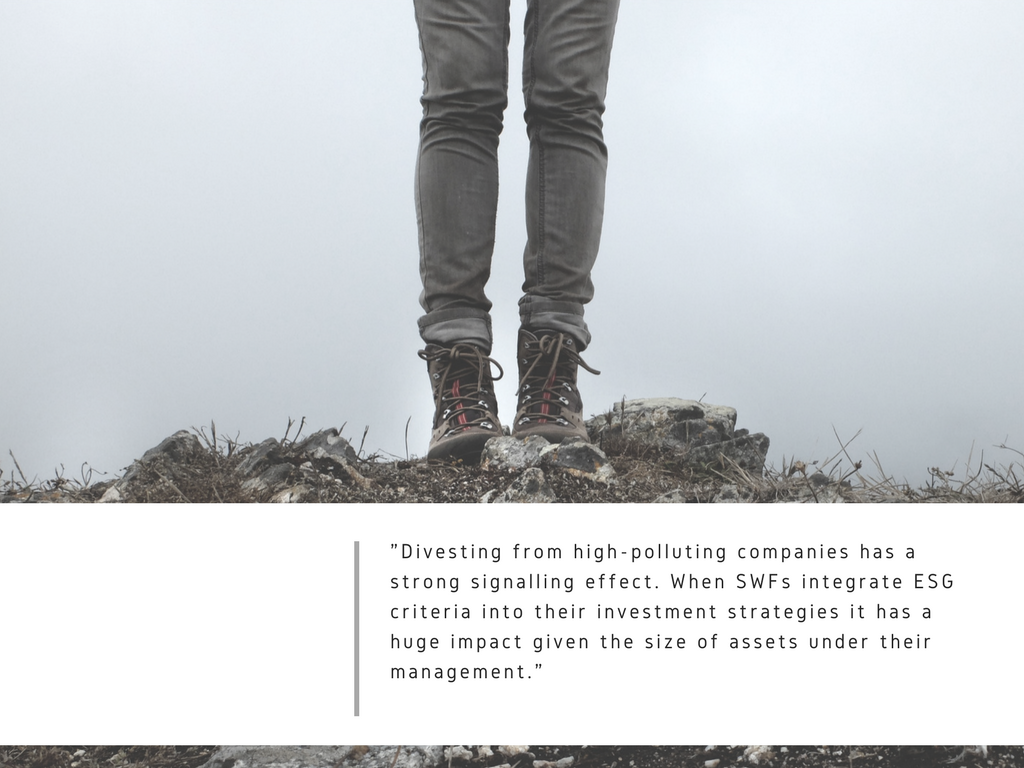Institutional investors and lenders, such as sovereign wealth funds, banks and private equity funds, are signalling a stronger emphasis on the Environmental, Social and Governance aspects of their investments.
An increasing number of investors require information and data from companies they invest in on how companies comply with environmental and social standards, for examples policies and practices related to labour rights, human rights, and pollution control. They also require information on their governance policies and practices, for example related to non-corruption policies, contributions to the society in which they operate (e.g. taxes), and stakeholder engagement.
To understand more about Sovereign Wealth Funds and ESG considerations I’ve talked with Javier Capapé Aguilar, director of the Sovereign Wealth Lab of IE Business School, who has undertaken research on Sovereign Wealth Funds (SWFs).
- How would you summarize your research in 5 words?
“Are sovereign wealth funds interested in ESG investments?”

- What were your main findings?
“In my research I’ve mainly covered the E and the G of ESG. I’m planning to enter in S very soon with a colleague.
Regarding the E, the main conclusion of the work that I’ve done for UN Environment is that Sovereign Wealth Funds are investing, on average, less than 1% of their total assets under management into environmental-friendly assets and opportunities.
Yet, the interest of this particular group of institutional investors is growing. There’s an increasing interest in “divesting” from high-polluting companies. Also, a relevant group of SWFs are planning to implement a set of defined ESG investment criteria into their strategic asset allocation. The group plans to design a framework to help other SWFs and themselves to correctly measure and consider risks and opportunities linked to ESG.
Regarding the G, I’ve worked on several research papers related to SWFs governance and also the SWFs influence in portfolio companies’ corporate governance. On the latter, a recent empirical research with co-authors is analysing how and how much Norway’s SWF is improving the corporate governance of its portfolio companies, both via engagement with companies’ boards and executives and also by the threat of exit (selling or reducing their stake in companies). Preliminary results show that companies tend to improve their corporate governance following Norway’s SWFs investments.”
- What was your motivation for engaging in this research?
“Hmm… I think there are two main reasons. SWFs represent a new way of capitalism, the so-called state capitalism. Where financial motivation is the driving force, but where strategic motives have an important say. To play successfully in the financial arena and simultaneously bring beneficial outputs to your society and people is a tough but beautiful combination of goals.
Also, SWFs tend to be very long-term oriented. This implies that SWFs (like other institutional investors such as pension funds or university endowments) think that in the long run better-governed companies and green assets will make a difference, so they have motivations to work towards these two objectives. The alignment of interests is key to mobilize resources towards ESG.”
- In your opinion, what are the 3 main ways institutional investors can contribute to the Paris Agreement and/or the Sustainable Development Goals?
“Divesting from high-polluting companies has a strong signalling effect.
When SWFs integrate ESG criteria into their investment strategies it has a huge impact given the size of their assets under management. It also has spillover effects. Asset managers realise that in order to win mandates from these big investors they need to fulfil certain ESG criteria. It’s a learning process.
Moreover, the integration of ESG criteria motivates the industry to continue with their efforts related to transparency: resulting in companies disclosing more and better information about their ESG actions and effects.
Also, SWFs are government-owned, so the ESG policies coming from governments (including the Paris Agreement or the SDGs) may be designed in direct collaboration with SWFs (or pension funds) so that the effects are wider and materialize faster, and place stronger pressure on other institutional investors at home.”
- What role/potential do you see for institutional investors in influencing the ESG performance of companies in the coming 20 years?
“First through signalling and increased costs of capital. Companies may be excluded from certain stock indexes because of the low quality of their ESG performance or poor disclosure. More institutional investors requiring for this will drive it. Also, companies with stronger regulatory pressure may access debt and equity markets at a higher cost than cleaner/better governed companies, ceteris paribus.
Second, through investing. The total assets under management of only SWFs is beyond US$7.5 trillion. More and more is invested directly in private markets (infrastructure, real estate, technology). If financial innovations and coordinated actions finally find ways to mitigate risks, institutional investors may help to bridge the current and future investment gap in infrastructure, which is key to reach the SDGs.
Third, if more institutional investors reflect about their long-term mission they will enter into more active and responsible shareholding actions that will frame big corporations towards improved ESG performance.”
Related links:
https://www.ie.edu/ie-foundation/applied-research/projects/sovereign-wealth-funds-2017/
http://www.greenfiscalpolicy.org/wp-content/uploads/2018/01/Policy-brief-SWF-2018.pdf


